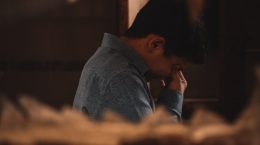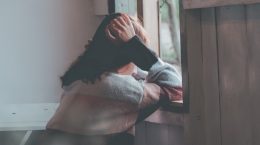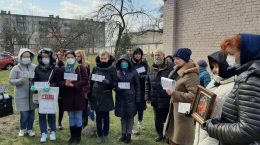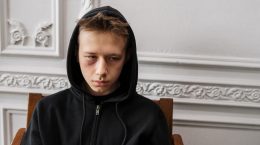In 2014, Decree No. 6 “On urgent measures to combat illicit drug trafficking” was adopted. According to this decree, the age of responsibility for drug-related crimes was reduced to 14 years. The interpretation of this Decree by the law enforcement agencies resulted in violations of the rights of minors by the Investigative Committee, the Prosecutor’s Office and the judiciary.
How children are imprisoned for organizing drug gangs
Since the release of Decree No. 6, massive repression began in Belarus against young people – anyone could be accused of something they did not do. Alexander Lukashenko suggested that conditions be created for those serving sentences for drug-related offences so that “death begs”. If there are many such criminals in the country, he said, “let’s allocate one of the colonies to it”. The penal colony No. 22 “Wolf holes” in Ivatsevichi began to specialise in drug offenders. In other colonies, units were set up with prisoners convicted solely under the article.328 They were marked with green stripes.
According to the statistics cited by human rights activists in Belarus, sentences against “organized criminal groups” began to prevail. For the sake of improving statistics, awards and titles, employees of the internal affairs bodiescommitted official crimes and disciplinary misconduct. Due to the huge amount of drugs and psychotropic drugs imported into the country, most of the convicted teenagers were involved in drug trafficking or became victims of provocative actions.
Hundreds of young people convicted under part 4 of Art.328 of the Criminal Code of the Republic of Belarus are minors. And these are non-violent crimes that are unfairly classified as “especially dangerous”. But it is very scary to get into a colony at such a young age. The young, still fragile psyche breaks down with every day spent in the colony. A penal colony is meant to rehabilitate, but such sentences break a people’s personality, depriving them of the opportunity to live a normal life later on.
Lawyers, representatives of the Prosecutor General’s Office and representatives of the Supreme Court say that all five elements of an organised criminal group must be proven in order to qualify a crime under Part 4 of Article 328. However, in practice, the courts prosecute teenagers under Part 4 on the basis of only one correspondence with an “unidentified person” from an online store. The Internet has become the main accusatory component of Part 4 of Art.328
Amnesty, but not for everyone
In 2019, those convicted of parts 1-3 of Article 328 fell under the mitigation of legislation (reducing the lower limit by 2 years). An amnesty for minors was also applied (minus 2 years). And in 2020, in all parts of Article 328, amnesty was applied only for minors (minus 1 year). Children who were serving a sentence under parts 1-3 of Article 328 were cut by 5 years, and children who were serving a sentence under part 4 – only 1 year. What are the experiences of teenagers who do not yet fully understand how their type of crime differs from the Part 3 offence? Moreover, in identical situations there is no uniform qualification of criminal acts.
Not a single teenager convicted under Article 328 of the Criminal Code of the Republic of Belarus created a “drug” business, was not its organizer and could not have realised that by messaging, he had joined an “organised criminal group”. Not a single minor also had any relation to laboratories and, accordingly, did not produce or import a narcotic substance into the country. Teenagers were drawn into criminal activity only because of their naivety and youthful maximalism.
By convicting teenagers under Part 4 of Article 328 of the Criminal Code, with no evidence in accordance with the text of the article, the judges show low qualification and incompetence. They show that they do not see the difference between a drug lord (the “unidentified person”) and a courier.
How article 328 violates the rights of the child
It should be noted that the legal basis for the regulation of children’s rights in our country is constituted by the Constitution of the Republic of Belarus, the Law on the Rights of the Child, the Convention on the Rights of the Child, adopted by the UN General Assembly and also signed and ratified by the Republic of Belarus, the United Nations Standard Minimum Rules for the Administration of Juvenile Justice (the Beijing Rules) and international agreements (Beijing Rules) and other international agreements. According to the documents, the main goals of juvenile justice should be aimed at ensuring their well-being, limiting the use of punitive sanctions, measures of influence on juvenile offenders should be commensurate with both the circumstances of the offense and with the personality of the child in conflict with the law.
From this it can be concluded that children should not be held accountable on an equal basis with adults. Imprisonment in places of deprivation of liberty should be an extreme measure when all alternative methods have already been used (community service, administrative punishment, suspended sentence, deferral of execution, and others).
In our country, there is the status of a child, which is legally enshrined at the age of 18. And no matter how it seems to us that there is no difference between a person of 17 years and 11 months and 18 years and 1 month, the border is spelled out. And this status is additionally required to be protected by the Convention on the Rights of the Child. Therefore, it is necessary to make changes, restore the criminally punishable age under Article 328 from 18 years.
On 24 April 2020, the United Nations Human Rights Council’s Working Group on Arbitrary Detention adopted Opinion No. 60/2019 on four juveniles following complaints of violations of the rights of minors in criminal proceedings. The working group concluded that the detention of three (V. Sharkovsky, E. Ostrovko, M. Bloshuk) is arbitrary, their rights have been violated, and the state authorities must immediately release them and pay compensation. However, these children are still behind bars.
Then to top it all off. While the teenagers are serving sentences of 8-10 years for organizing a criminal gang, two deputy prosecutors of the Soviet and Leninsky districts of Minsk have been charged under Part 1 of Article 328 (the acquisition of drugs for the purpose of selling). The KGB investigating the case does not specify that the drugs were acquired using official powers. The sanction of the article allows for the imposition of punishment in the form of restriction of freedom (that is, “chemistry”, including staying in one’s own home). And under the 2019 amnesty law, they are likely to be released…







